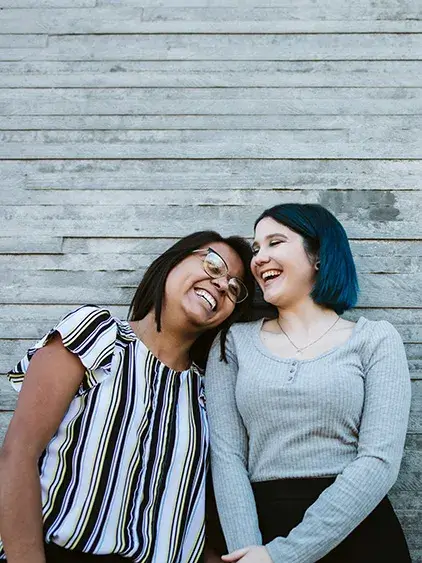Consent & Relationships
All About Consent & Healthy Relationships
Healthy relationships aren’t just for couples! We need healthy relationships with our parents, trusted adults, friends, and partners.
Honestly, this is what healthy looks like.
A quick video from our friends at AMAZE shows the difference between healthy and unhealthy relationships.
What Is Consent?
Consent means agreeing to engage in a specific activity with someone. Engaging in sexual behavior with someone who does not, or cannot, consent is sexual assault or rape. Here are some key takeaways when it comes to understanding consent:
Let’s Talk About Consent
Talking about consent is one of the most important conversations you can have. It might feel tricky, but honestly is here to help you get started. Below, you’ll find key topics to help you confidently discuss consent with the youth in your life.
Young Kids
Even when your children are young, you can start to discuss their bodies. Use correct terminology like “penis” and “vagina” when describing body parts, just like you’d say elbow or toes.
School-Age Kids
Teach them to ask a friend for a hug before giving one. Talk with your children about personal space, respecting when others do not want to be touched.
It is important for kids to learn how to handle rejection. Discuss that it’s okay to be told “no” and healthy ways to practice acceptance, empathy, and respect for boundaries.
Focus on the importance of not having secrets. Teach kids that if anyone asks them to keep a secret about touching their bodies or having them touch someone else’s body, they should tell a trusted adult right away, and they will not be in trouble. Kids should have 2-3 trusted adults in their lives whom they can identify with.
Preteens & Teens
Explain what role alcohol may play in sexual scenarios. Discuss how alcohol impairs someone’s ability to consent or know if someone is consenting, but that ultimately, actions under the influence of alcohol are not exempt from responsibility. Parents should also note the differences between impairment and incapacitation, and that someone who is incapacitated cannot consent.
Explain the age of consent. Be aware that laws around consent can vary depending on age and location. Encourage youth to understand that different situations may have legal implications, and help them think about how age differences might impact relationships. The Oklahoma Age of Consent is 16 years old. A “close in age” exemption allows minors over age 14 to consent to a partner younger than 18 (if they are within two years of age).

Partner Violence
Relationships can be complicated and look different for everyone, but dating violence or partner abuse is never okay. Tell a trusted adult if you are experiencing dating violence or abuse (physical, verbal, or sexual).
Abuse can include:
- Forcing you to engage in sex
- Controlling your reproductive choices, like forcing you to get pregnant or not use birth control
- Hitting, kicking, or slapping you
- Threatening you and trying to control what you do and where you go
Dive Deeper
Ready to explore more? These resources are here to answer your questions and help you build healthy, respectful relationships.
One Love Foundation

Love Is Respect

Futures Without Violence

